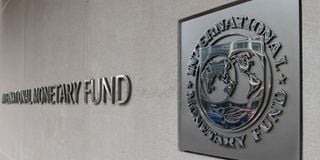
An exterior of the International Monetary Fund Headquarters in Washington, DC in this file photo taken on March 27, 2020.
Kenya should not increase its budget if it hopes to recover from the effects of the Covid-19 pandemic and support the health system, the International Monetary Fund (IMF) has said.
The Fund cautioned Kenya against relying on public debt to finance its budget, advising it to live within its means.
This comes when the country’s public debt has become a headache to the health system and general economy.
IMF spokesman Gerry Rice said the Covid-19 pandemic has increased Kenya’s debt vulnerability.
“Kenya continues to face an unprecedented external shock that will severely challenge the economy’s and the policy path. We recommend a pause in fiscal adjustment to accommodate increased health spending and support for the economy during this shock,” Mr Rice said at an IMF policy briefing released this week.
He said IMF is holding discussions with Kenyan authorities over the issues, adding that as the country recovers from the pandemic, the government must come up with a budget it can finance without necessarily borrowing.
Debt distress
The IMF ranks Kenya among countries at high risk of debt distress, with external loans being the biggest problem on the economy.
Kenya got a temporary relief two weeks ago when its request for a six-month suspension of loan payments was approved by the Paris Club of major economies.
The countries cited the hardships caused by the Covid-19 pandemic and the need to support the health system.
Mr Rice said IMF is holding talks with Kenya on the possibility of devising a programme to support the next phase of response to the coronavirus crisis.
“As we move beyond the crisis, it will be critical that the authorities resume the pursuit of fiscal sustainability and adjustment, especially now that the shock has increased the debt vulnerability,” he said.
Revenue streams
Kenya has made moves to expand its revenue streams from this year by ending tax relief measures that were announced to cushion citizens and businesses against the effects of the Covid-19 pandemic. The government has also introduced new taxes
Treasury introduced digital services tax this month. It is targets businesses operating on digital platforms.
There is also the Minimum Tax which is charged on businesses making at least Sh50 million a year.
The government has pledged to seal revenue loopholes. Rogue individuals and firms evade tax, denying the government millions of shillings every year.
The IMF says technical works on the discussions and agreements arrived at towards the end of last year have already begun.




No comments :
Post a Comment